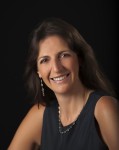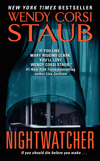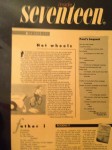Between The Lines Interview with Wendy Corsi Staub by Paula Tutman
Wendy Corsi Staub is an Extra Terrestrial. She must be. It’s the only explanation. How else can one person publish nearly 80 novels in a 20 years span? There must be some other-worldly assistance at work. Or perhaps, just perhaps, she’s one of those rare human beings.
Staub, who’s also written under the pseudonym Wendy Markham, appears to belong to that unusual sub-species whose thoughts seem to roll out of her imagination and onto the page like water. She’s currently emerging from what she calls, deadline Hell. She’s just completed back to back releases, two books as part of a trilogy.
Let’s face it, Hell for most authors would be tantamount to sneezing a pumpkin through their left nostril by squeezing out one, perhaps two novels per year. But not for Wendy. For Wendy, skirting the white hot coals of Hell is touring for the release of two novels, NIGHTWATCHER and SLEEPWALKER with a the third in the trilogy, SHADOWKILLER, on sale in January, while delivering a new manuscript to her editor, which will kick off a new trilogy with Harper, launching later in 2013. In case you’ve lost count, that’s two book releases and a deadline for a third, all within a month.
Wendy can remember her first big writing assignment. It was Mrs. Pizzolanti’s third grade class and Wendy was eight years old. The assignment: an essay on Abraham Lincoln.
“One day as Abe and Mary Lincoln rode along in their carriage, Abe saw a littlebird. ‘Look, Mary!’ he exclaimed. ‘That little bird is building a nest just like we will build a new nation.’”
“I suspect I took a bit of creative license with the scene, as my historical research capabilities were quite limited in 1972,” Wendy says.
But Mrs. Pizzolanti saw real talent in Wendy’s writing and encouraged her. Wendy went home and announced to her parents she was going to grow up to be a writer.
She honed her talent on poems, music, essays, the usual stuff kids write. She even submitted her Abe Lincoln essay for publication. She was rejected. It only fueled her. In High School she wrote the usual stuff, yearbook, literary magazine, the school radio broadcast, she even wrote a little sheet music. But in the fifth grade it hit her. She could write novels. “Longhand on colored loose leaf paper. I still have them and have used one or two of those ideas in published books,” Wendy says.
Her first paid gig was a poem she wrote in college. She sold it to Seventeen Magazine for $15.00 and still has the paystub. She told me, “The check is long gone, probably used to buy beer.”
She was even a ghost writer for Fabio’s steamy romantic novels in the 90s.
Her first novel, RWA Rita Award winner SUMMER LIGHTNING, was a supernatural young adult thriller about a seventeen year old girl who must decide between the love of her boyfriend or a spirit who’s trying to woo her.
Her first real bout with rejection came when the bottom fell out of YA paranormal in the 90s. “Virtually overnight, (it seemed to me, the market for those books evaporated.” She was told her contract wouldn’t be renewed because her publisher was folding the imprint. Her longtime editor suggested she try her hand at an adult suspense novel. She did, in what became, DEARLY BELOVED, her first thriller. “My philosophy, when rejection rears its ugly head, has always been to reinvent either the project or the genre, rather than waste time dwelling on slammed doors.”
 You might suspect that after 75 novels, it gets easier. But Wendy will tell you, it actually gets more difficult. “I work harder, after all these books, at the actual writing. When you write your first book, there’s nothing you’ve already done, so doors are wide open. When you write your 75th, you have to avoid repetition and make it completely fresh…while delivering the exact same thing (a twist-filled domestic suspense novel) you’ve written many times before. It’s challenging! Every writer has favorite adjectives, etc. I try really hard to weed out stock phrases and clichés and reach for new metaphors.”
You might suspect that after 75 novels, it gets easier. But Wendy will tell you, it actually gets more difficult. “I work harder, after all these books, at the actual writing. When you write your first book, there’s nothing you’ve already done, so doors are wide open. When you write your 75th, you have to avoid repetition and make it completely fresh…while delivering the exact same thing (a twist-filled domestic suspense novel) you’ve written many times before. It’s challenging! Every writer has favorite adjectives, etc. I try really hard to weed out stock phrases and clichés and reach for new metaphors.”
Her writing is ever-evolving. “I draw upon relationships with family and friends, childhood experiences, places I’ve visited or just dreamed of visiting, the nightly news, strangers’ conversations, I’ve eavesdropped upon, things my kids say…you name it.”
She divorces herself from what family members might think. “If I let myself worry about how my loved ones will react to what I write before it’s even written,” Wendy says. “I would be perpetually paralyzed with guilt, fear, and/or embarrassment.”
If writing for Fabio didn’t stunt her creativity or ruin familial relationships, nothing would.
Yet, she remains happily married to her readers. “I don’t divorce myself from what they think, ever. Commercial authors can’t afford to lose sight of what their readers want. I know mine have certain expectations and I keep that in mind as I write every book. My loyal readers have been buying my suspense novels for fifteen years because they want rich characters, domestic settings, and twists—big twists—from me, and I really try hard to deliver.”
As Wendy has grown, so has her writing. It’s become more human, more relatable,
she crafts her words for readers to taste, not just read, and those words come from her own bitter flavors. “When I launched my career, I had never lost anyone within my inner circle of friends and family. In the past two decades, I’ve lost my mom, three of my four grandparents, three very close, very young friends—all unexpectedly—and countless other relatives, friends, and colleagues.”
Those tragic kinds of losses change the way you look at life. Every day is now fraught with fragility, and I think that’s worked its way into my novels.”
The birth of her first child inducted Wendy into that all-too fragile world. She was no longer an observer, but a participant. “The world suddenly became a precarious place and I knew that I would give my life to protect him. The stakes were higher—and I understood the concept that just about everyone has something he or she would die—or kill—to protect.”
That realization changed the entire complexity of her writing and her novels. “The heroines of my early thrillers were not mothers. That changed with the first thriller I wrote after having my son, and I created a niche writing what my publisher’s sales team dubbed “Mom Jep”—moms in jeopardy. I’ve since written some heroines who were childless, but the theme of terror striking close to home and hearth has definitely been prominent in my work over the past decade and a half or so.”
Staub goes on to say, “Twenty years have passed since SUMMER LIGHTNING was published. Readers have changed because the world has changed, thanks in great part to the internet. We now live in an instant gratification society. Our needs are more urgent and our attention spans are shorter. We have less patience and are less inclined to put in our time and wait for the payoff. So I’ve really tried to focus on pacing in my more recent novels. I do my best to keep it fast, and keep the surprises coming.”
Here’s how Wendy describes her new trilogy.
“The initial premise came to me within a day or two of the September 11 attacks, when I heard on the local NYC news that crime was drastically down all over the city. Robberies, assaults, murders, etc., were all but nonexistent as people came together in an unprecedented way. I wondered what would have happened if a serial killer had come out of the woodwork to wreak chaos on a city already in chaos. But there was absolutely no way I was going to write about it when it was all so raw. I promised myself that I would wait at least a decade to revisit the plot, and that is exactly what I did.
 The very last scene of NIGHTWATCHER contains a twist that opens the door to SLEEPWALKER’s plot, and the same is true of the final twist in SLEEPWALKER, which leads into SHADOWKILLER. Like NIGHTWATCHER and my other thrillers, these books feature elements my readers have come to expect from me: villains hiding in plain sight, multiple viewpoints, and of course, plenty of surprises.
The very last scene of NIGHTWATCHER contains a twist that opens the door to SLEEPWALKER’s plot, and the same is true of the final twist in SLEEPWALKER, which leads into SHADOWKILLER. Like NIGHTWATCHER and my other thrillers, these books feature elements my readers have come to expect from me: villains hiding in plain sight, multiple viewpoints, and of course, plenty of surprises.
These are my first-ever back-to-back adult thrillers. Harpercollins published NIGHTWATCHER and SLEEPWALKER just four weeks apart, with the third installment, SHADOWKILLER, going on sale three months from now. As I answer these interview questions on a Sunday evening, SLEEPWALKER made its debut on this morning’s New York Times bestseller lists, so…so far, so good!”
Perhaps, Wendy Corsi Staub operates in Scolasian-time, you know from the original, far superior Star Trek series when Captain Kirk and the rest of the earthlings moved at a painfully slow pace compared to the hyper-accelerated aliens that swirled around them Or maybe, just maybe, Wendy Corsi Staub isn’t an extra-terrestrial, after all. She’s just one of those earthlings who’s able to see past the veneer of everyday life and ring every bit of moisture from each creative thread of her imagination. Oh, to be a stray drop of creativity from the mind of a woman born to be an uber-novelist.
Wendy Corsi Staub is not the author she used to be. She has become the author she’s always wanted to be.
Mrs. Pizzolanti would be proud.
*****
 NEW YORK TIMES bestseller Wendy Corsi Staub is the award-winning author of more than seventy-five published novels and has sold more than four million books worldwide. Under her own name, Wendy achieved New York Times bestselling status with her single title psychological suspense novels. Those novels and the women’s fiction she writes under the pseudonym Wendy Markham have also frequently appeared on the USA TODAY, BARNES AND NOBLE TOP TEN, and BOOKSCAN bestseller lists.
NEW YORK TIMES bestseller Wendy Corsi Staub is the award-winning author of more than seventy-five published novels and has sold more than four million books worldwide. Under her own name, Wendy achieved New York Times bestselling status with her single title psychological suspense novels. Those novels and the women’s fiction she writes under the pseudonym Wendy Markham have also frequently appeared on the USA TODAY, BARNES AND NOBLE TOP TEN, and BOOKSCAN bestseller lists.
To learn more about Wendy, please visit her website.
- A Between the Lines Interview with Steve Berry by Paula Tutman - April 30, 2014
- A Between The Lines Interview with Jennifer McMahon by Paula Tutman - January 31, 2014
- Between The Lines Interview with Anne Rice by Paula Tutman - September 30, 2013


